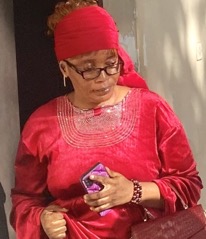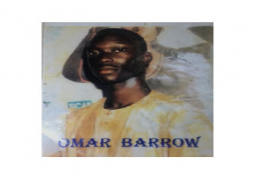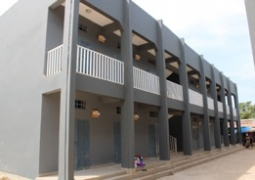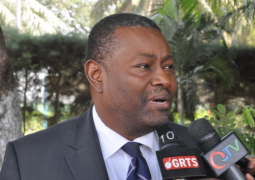
When the case was called before Justice Ebrima Jaiteh at the High Court in Banjul, Counsels Wakada and F. Touray announced their appearance for the State. Counsel Lamin J. Darboe appeared for the first accused, Ousainou Bojang, while A. Sillah represented the second accused, Amie Bojang.
Journalist Bakary Mankajang also reappeared in court yesterday and produced both the edited and unedited audio recordings of his interview with Mama Jabbi. The recordings were played in open court.
Meanwhile, defence counsel Lamin J. Darboe sought to have the audio recordings admitted into evidence, stating: “I wish to tender the original edited and unedited audio recordings between Bakary Mankajang and Mama Jabbi.”
He continued: “This is in the interest of justice. These recordings were made voluntarily, without any coercion. They reflect what Mama Jabbi herself claimed had occurred. In the context of this case, it is submitted that these audios are relevant and admissible, as all foundational requirements have been met. Furthermore, the production of these recordings was made pursuant to a court order.”
Counsel Darboe cited numerous legal provisions to support his submission.
For his part, Counsel A. Sillah also supported Counsel Darboe’s request to have the audio recordings admitted into evidence, stating: “We have no objection to the admissibility of the said recordings, as they are highly relevant to the case.”
State Counsel Wakada objected to the admission of the audio recordings in court, stating: “Our objection is based on the court’s order, which was explicit and clear. Defence Witness 10 informed the court that he had recordings, and the court ordered him to produce them. The directive was for him to produce the said audios, not to tender them as evidence.”
Counsel Wakada further cited several provisions of the Evidence Act to support his submission.
In his ruling, Justice Jaiteh stated: “DW10 is one Bakary Mankajang, a journalist by profession, and he testified as the 10th Defence Witness (DW10) for the 1st Accused person. He commenced his testimony on the 6th of October 2025, and in the course of his evidence, he stated that he conducted an audio interview with PW3, Mama Jabbi, in connection with this case prior to its institution.
“He further informed the court that he possesses both the edited and unedited versions of the said audio interview, which he is able and willing to produce before the court.
“The Prosecution, however, objected to the admissibility of the audio recording on the ground that it was not accompanied by a certificate under Section 22 of the Evidence Act, which governs computer-generated evidence.
“This objection, in the court's view, is misconceived. The pertinent question is whether the audio recording contained in the flash drive qualifies as computer-generated evidence within the meaning of Section 22 of the Act.
“Section 22 defines a computer as ‘a device for storing and processing information,’ and a reference to information being derived from other information refers to such derivation ‘by calculation, comparison, or any other process.’ The flash drive in question merely stores the audio interview; it does not generate or process the data through calculation or comparison. Hence, it cannot be classified as computer-generated evidence in the strict statutory sense contemplated by Section 22.
“If one were to adopt an overly broad and simplistic interpretation of "computer-generated evidence," then even court pleadings, affidavits, and indictments, which are typed and printed using computers, would all require certificates of authenticity under Section 22.
“That was clearly not the legislative intent. The purpose of the certificate requirement is to safeguard the authenticity and reliability of data that is produced or computed by a computer, such as financial calculations, digital analytics, or algorithmic outputs, where errors in processing could materially affect accuracy. It does not extend to ordinary documents or audio files merely stored or transferred using a computer device such as a flash drive.
“In the present circumstances, the flash drive containing the audio interview between DW10 and PW3 does not constitute a computer-generated document; it is a recorded piece of evidence directly relevant to the issues before this court. It was ordered to be produced under Section 220, and its contents are relevant within the meaning of Section 3 of the Evidence Act. Consequently, the objection by the Prosecution is overruled.
“At that stage, the learned Defence Counsel for the 1st Accused applied for both the edited and unedited audio recordings of the interview between DW10 and PW3 to be produced and tendered in evidence. The law governing the production of documents before a court of law in this jurisdiction is contained in Section 220 of the Evidence Act, 1994, which provides as follows:
“Section 220 (1) A witness, subject to the provisions of section 222, summoned to produce a document shall, if it is in his possession or power, bring it to court, notwithstanding any objection which there may be to its production or to its admissibility. (2) The court, if it sees fit, may inspect the document or take other evidence to enable it determine its admissibility. (3) If, for such a purpose, it is necessary to cause a document to be translated, the court may, if it thinks fit, direct the translator to keep the contents secret unless the document is to be given in evidence.
“Pursuant to the above provision, this court ordered DW10 to produce both the original unedited and the edited versions of the audio recording of his interview with PW3.
“By virtue of Section 220(1), a witness is obliged to produce a document in his possession once directed by the court, notwithstanding any objection to its production or admissibility-except as limited by Section 222, which concerns matters of public interest. In the present case, no issue of public interest arises to justify the exclusion of the document.
“In compliance with Section 220(2), the court inspected and played the audio recording for the purpose of determining its admissibility. Upon listening to the content, the court found that the audio recording is relevant to the issues in controversy in this case. It is well established that the primary test of admissibility of evidence is relevance, as codified in Section 3 of the Evidence Act. Once evidence is relevant to the facts in issue or to facts that make the existence of any fact in issue more probable or less probable, it becomes admissible, subject only to exclusionary rules of law.”
Accordingly, the flash drive containing the audio interview between DW10 and PW3 is admitted into evidence and marked as Exhibit D37 for the Defence of the 1st Accused.
It was further ordered that the contents of Exhibit D37 be transcribed and the transcript be annexed to and form part of Exhibit D37, with copies to be duly served on the Prosecution and Defence Counsel.




